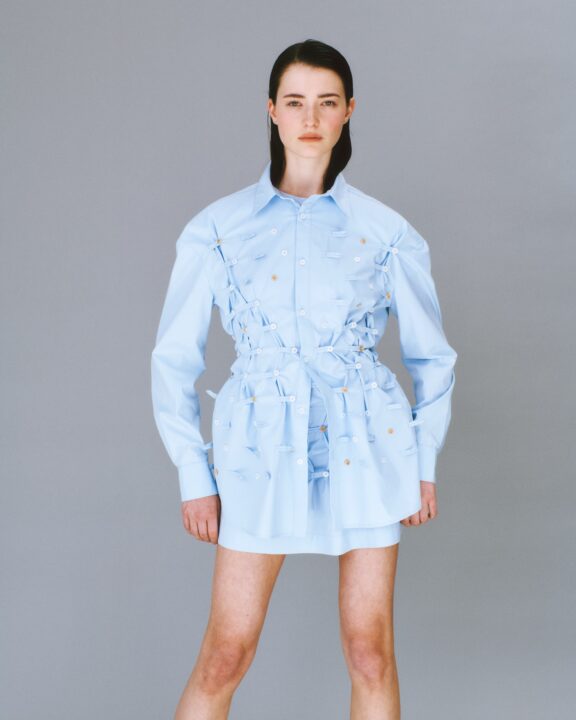How might a science-backed wellness company stand out in a sceptical and over-saturated market? For many direct-to-consumer brands, a digital-first strategy is a commonly walked path to success. Seed, however, has taken a new route in providing their consumers with a knowledge-first, digital-focused strategy, utilising science-backed information as their main form of content to promote, engage with and educate their customers.

The wellness industry continues to grow, currently estimated to be worth 4.75 trillion dollars, it shows no sign of slowing down. Spanning from celery juice to alternative medicines, its popularity can be attributed to how it touches on consumer pain points; health, fitness, nutrition, appearance, sleep, and mindfulness.
Started by Ara Katz and Raja Dhir, direct-to-consumer supplement brand Seed is an innovative biotech company producing research-backed probiotic supplements. Its key product offering, Daily Synbiotic, features probiotic strains tailored towards the health needs of both men and women, claiming to boost muscle recovery, promote skin health, reduce inflammation and increase energy levels. While such claims are alluring, they aren't unheard of within the highly saturated wellness industry, and often lead to brands being caught up in controversy surrounding misinformation and subjective views surrounding health. How might a science-backed wellness company stand out in a sceptical and over-saturated market?
Curiosity as Currency.
A recent survey found that 45% of consumers value transparency from brands within their social media presence, placing it above other key social media characteristics such as a distinct brand personality and compelling storytelling. Seed’s social media approach focuses on educational brand messaging that seeks to create a sense of inclusion and accessibility, not often found within science and biotech. They achieve this with content surrounding consumer pain points within health and wellness. Rather than specifically pushing their product as the answer to these pain points, their content centers around science and data within topics such as immunology, microbes, and digestive health. Knowledge is their key marketing tool, consumers armed with knowledge become more receptive to science-backed products, rather than falling victim to the frequent deception that runs rampant in the wellness industry. Seed believes that investing in the education of their consumers will result in a positive return - a tactic that seems to be working, generating 400% customer growth since March 2020.
The company has built its messaging around wellness education into the foundations of its brand community. A recent collaboration with LA-based streetwear label Come Back As A Flower saw the launch of (Home)Room, an interactive Instagram-based digital event. Participants took part in at-home science lessons and quizzes over a series of Instagram stories, with topics ranging from ecology to gut microbiome. After completing the course, users received a limited-edition sweatshirt from the collaboration. The venture was designed to create curiosity into a form of currency. However, in doing this the brands were able to gather data around how willing consumers are when it comes to engaging and learning about health. With an overwhelming number of participants and the collaboration ‘selling out’ overnight, Seed was able to harness a strong sense of engagement and involvement from their brand community.


Friction is Future.
The impact of coronavirus has generated an increase in businesses moving their focus to direct to consumer markets as well as reinforcing their online marketing and sales channels. With such a vast range of products becoming available through e-commerce, brands are racing not only to garner the attention of consumers but to take them through the marketing funnel at a record pace. Co-Founder Ara Katz believes that such an approach within today’s digital landscape does not equal high customer lifetime value. Katz speaks of Seed’s marketing approach as “friction is future”, meaning that slowing down the rate at which consumers move from awareness to action leaves more lasting impressions on consumers (given that the experience is positive), and can result in increased customer loyalty.
A key part of this approach is found not only within the brand’s social media presence but through their website experience. Visitors must first scroll through information about Seed’s approach to probiotics, science, and the planet before being introduced to the product itself. Such a journey might seem long to consumers accustomed to fleeting online shopping experiences, though its Co-Founder claims that “putting friction into an experience over indexes the person’s intention and also communicates a value set that reflects our commitment to precision, education, and integrity of how science is communicated and transparency.” Seed’s e-commerce experience is closely aligned with its brand messaging surrounding informative marketing and championing transparency.
Accountability within Affiliate & Influencer Marketing.
With such a rigorous approach to transparency, grey areas such as influencer marketing cannot be overlooked. The influencer industry is now estimated to be worth almost $14 billion, with brands looking towards sponsored posts and influencer partnerships as a well-versed strategy in building brand awareness and increasing sales. However, such partnerships are prone to misleading consumers, with unregulated products and unbacked claims rife within the wellness industry.
The launch of Seed University further enhanced its science-first brand culture. The program evaluates potential brand partners based on their ability to understand Seed’s brand ethos, as well as the scientific claims backing the product these potential partners wish to promote. Candidates must first complete a 59-minute course and pass an exam to be eligible to promote seeds products. Even celebrity partners are required to complete the program, with actress Sophia Bush and model Karlie Kloss having graduated from Seed University. The program aims to create a sense of accountability within paid promotion, and in an industry with a record of deception, Seed hopes that it will have a knock-on effect, encouraging influencers to promote wellness brands that are backed by research.

For many direct-to-consumer brands, a digital-first strategy is a commonly walked path to success. Seed, however, has taken a new route in providing their consumers with a knowledge-first, digital-focused strategy, utilising science-backed information as their main form of content to promote, engage with and educate their customers. By bringing transparency to what is otherwise a murky and elusive area, Seed has proven that its customers are receptive to knowledge and that education can be a key tool in creating a successful and trusted wellness brand.





